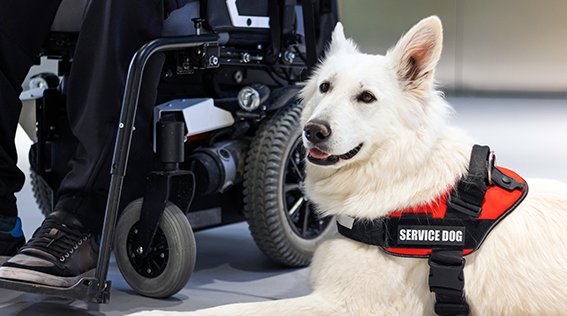The Louisiana Support and Service Animal Integrity Act (“LSSAIA”) was passed during the 2024 Louisiana legislative session and became effective on August 1, 2024. While this state law is not intended to usurp the rights of the federal government to provide protections to people with disabilities and the legitimate use of service animals, proponents of the new law say it will restore integrity into the process of determining whether an individual has a disability that requires the use of a support animal.
To the extent permissible under the Louisiana Equal Housing Opportunity Act (R.S. 51:2601), the Fair Housing Act (42 U.S.C. 3601), the Americans with Disabilities Act (“ADA”), and other federal legislation, the LSSAIA sets up guard rails that will affect physicians and other healthcare providers who routinely provide letters certifying medical conditions for patients. Healthcare providers who are in violation of the new law, patients who misrepresent their need for emotional support animals, and sellers who pass off pets as emotional support animals may be subject to penalties.
Under the LSSAIA, no healthcare provider shall produce documentation relating to an individual’s need for a support animal unless the healthcare provider complies with all of the following:
- Possesses an active and valid Louisiana license or an active license within a healthcare profession that has a licensure compact to perform the healthcare services being offered to an individual;
- Is qualified and licensed to evaluate and diagnose disabilities and has performed a disability assessment of an individual;
- Includes in the documentation relating to an individual’s need for a support animal all the following:
- The effective date of the documentation.
- The license number of the healthcare provider.
- The type of professional license held by the healthcare provider.
- Establishes a therapeutic relationship with an individual no less than thirty days prior to producing the documentation regarding the individual’s need for a support animal.
- Has engaged with an individual in person or remotely in at least two sessions before issuing documentation determining that the individual requires a support animal.
- Performs a clinical evaluation of an individual no less than thirty days before producing documentation regarding individual’s need for a support animal.
The law defines therapeutic relationship as the provision of healthcare services by a healthcare provider in good faith and with actual knowledge of an individual's disability and that individual's disability-related need for a support animal. It excludes services provided by an individual or entity that issues a certificate, license, letter or similar document that purports to confirm, without conducting a meaningful assessment of an individual's disability or an individual's disability-related need for a support animal, that a person has either a disability or a disability-related need for a support animal.
These new restrictions and penalties affecting healthcare providers, patients, and businesses selling support animals can be found here.
What is a service animal?
The umbrella term for any domesticated animal that performs some task for or provides emotional support or assistance to humans is a working animal. While pets can be considered working animals in some cases, they are excluded from this definition in this article.

Service animals, under the ADA, is defined as a dog[1] that has been individually trained to do work or perform tasks for an individual with a disability. In Louisiana, service dogs in training are also considered service animals. The task(s) performed by the dog must be directly related to the person's disability. The dog must be trained to take a specific action when needed to assist the person with a disability. The LSSAIA does not apply to service animals.
Service animals help people with mental or physical disabilities by working, providing assistance, or performing tasks for the owner (who is also called the handler) with the disability. The person with a disability and their service animal can collectively be called the service animal team. Common examples are guide (seeing eye) dogs, hearing dogs and psychiatric service dogs (PTSD or anxiety dogs). They are the most protected type of assistance animals and can be defined with variations under state and federal law. Examples include:
- A person with diabetes may have a dog that is trained to alert him when his blood sugar reaches high or low levels.
- A person who uses a wheelchair may have a dog that is trained to retrieve objects for them.
- A person with depression may have a dog that is trained to perform a task to remind them to take their medication.
- A person with PTSD may have a dog that is trained to lick their hand to alert them to an oncoming panic attack.
- A person who has epilepsy may have a dog that is trained to detect the onset of a seizure and then help the person remain safe during the seizure.
What is not a service animal?
Under the ADA and Louisiana law, emotional support, comfort, or companion animals DO NOT qualify as service animals. The same is true for facility, therapy, and other types of animals. Other working animals like bovines used for transport and labor in farming, herding dogs trained to round up cattle, bomb sniffing K-9s used as a security measure for large events, and your household pets also don’t qualify as service animals under the law.
Emotional support animals (sometimes called comfort or companion animals) help reduce either a person’s identified emotional symptoms or some effect of a person’s disability by providing companionship to its owner. These animals are typically used by only its owner (handler) and are afforded some protection under federal housing laws. Handlers may have both an emotional support animal and a service animal. The LSSAIA will impact this group of animals and handlers.
Therapy animals (sometimes called facility animals) provide therapeutic contact to one or more patients. These animals are typically trained to work with groups of people and be tolerant of various environments. They are used clinically, such as in hospital recovery settings or post-traumatic event counseling. Unlike assistance animals, therapy animals can be owned by a facility or another third party who provides the animal as a therapeutic tool to multiple people.
Online Education
LAMMICO offers insureds complimentary access to online education titled, “Patients with Service Animals: Concerns and Risk Issues,” through our proprietary risk management platform, Medical Interactive Community. This activity utilizes sample cases and questions and answers to convey practical strategies to help healthcare providers accommodate patients with service animals. To access this activity, log in as a Member at lammico.com. For more information or questions, please contact the LAMMICO Risk Management and Patient Safety Department at 504-841-5211.
[1] Miniature horses sometimes must be accommodated as well under the ADA.

